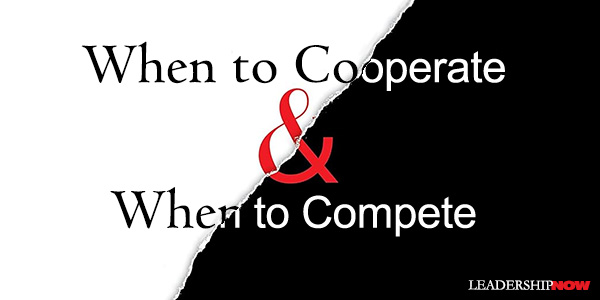 |
 |
10.26.15

When to Cooperate and When to Compete
AS WE navigate through life, we must be able to cooperate and compete. Knowing what to do when is very important to getting where you want to go and to where you want to go next time. In Friend and Foe, authors Adam Galinsky and Maurice Schweitzer state that all of our relationships are both cooperative and competitive and we get more out of life when we learn to find the right balance between acting as a friend and acting as a foe. Drawing on interdisciplinary studies, they show how to manage social comparisons (We crave comparisons because we like to know how we’re doing compared to the people around us.), get and keep power, how to get others to put their trust in you and what to do when you lose it, the art of seeking another perspective, negotiating, when it’s best to go last and when it’s best to go first, and finishing every interaction well. When it comes to power, it’s not so much how powerful we are, but how powerful we feel that determines how we think and act. Whether you have it or feel it, power makes us more focused on our own vantage point and oblivious to the perspective of others. The key to keeping our power is being able to see the world through the perspectives of others. There is an acceptable range of power that you can display relative to your actual power. Exceed it, and you will be ostracized. You also need to find the right balance between being confident and deferential. It’s usually a lack of deference rather than an excess of confidence that gets powerful people into trouble. Interestingly, they say we crave hierarchy because it helps to manage the tension between cooperation and in competition. Hierarchy provides a means for solving the question of how we distribute scarce resources. It also facilitates coordination. Studies demonstrate that co-leadership usually doesn’t work. “Co-leadership can kill both ideas and people, because it creates uncertainty over who is really in charge. Of course, co-led teams are not always ineffective and dangerous. But when there is not clear division of labor among these leaders, coordination becomes difficult, patterns of deference can disappear, and conflict can erupt.” Hierarchy is less useful the more human the task or the more cognitively complex—more thought than any one person can attend to. Why? “Because to make the best complex decisions, we need to tap ideas from all the rungs of the hierarchical ladder and learn from everyone who has relevant knowledge to share.” Steve Jobs said, “You have to run by ideas, not hierarchy.” But here is an interesting find. When over 30,000 Himalayan mountain climbers were analyzed, they found that members of expeditions from more hierarchical countries were more likely to die on the expedition because in countries and cultures that are hierarchical, decision-making tends to be a top-down process. These expedition members are less likely to speak up and less likely to alert leaders to changing conditions and impending problems. They say that asking for advice does more than turn adversaries into advocates. “It can also help you supercharge your advocates and lead them to help you climb up the corporate ladder.” And when you don’t take their advice, you need to explain that even though you didn’t take their advice, it gave you a unique perspective and insight that led to your success. Always follow up with your advice-givers. Friend and Foe is a very interesting read and full of useful advice and insights to help you get along and get ahead. It will go a long way to developing the awareness that is essential to leadership. No matter what happens, if your interaction ends well, people will tend to remember it well. More importantly, it sets the stage for anything that comes next. 
Posted by Michael McKinney at 07:42 AM
|
BUILD YOUR KNOWLEDGE
 

How to Do Your Start-Up Right STRAIGHT TALK FOR START-UPS 
Grow Your Leadership Skills NEW AND UPCOMING LEADERSHIP BOOKS 
Leadership Minute BITE-SIZE CONCEPTS YOU CAN CHEW ON 
Classic Leadership Books BOOKS TO READ BEFORE YOU LEAD |